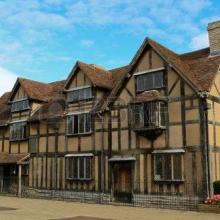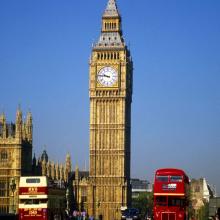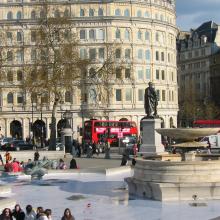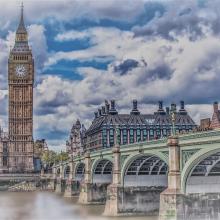Description
This program is designed to link classroom activities, site visits, and walking tours to bring our readings to life and to enrich students' understanding of the ways in which contemporary London has been shaped by its past.
The last years of the reign of Elizabeth I presented the country with a political crisis: Elizabeth did not have a male heir and forbade the court to discuss who might be her successor, uncertainty about the future was only resolved by the accession of a foreign king--James VI of Scotland who became James I of England. The turmoil of the period is seen in the plays of Shakespeare and his contemporaries. We will read a Shakespeare play and see a production of it performed at the Globe theatre. We will also tour the Globe theatre, do a walking tour of Shakespeare's Southwark, and a tour of Southwark Cathedral.
Later in the seventeenth century the Great Fire wiped out large sections of London. Much of the architecture we associate with London was built after this event, and building codes today are still impacted by fears of the fire. Samuel Pepy's Diary will provide a basis for examining the devastation of the fire. Visits to the Museum of London and to some of the buildings in reconstructed London such as St. Pauls' Cathedral and some of Sir Christopher Wren's churches illustrate the importance of this event in London's history.
A major turning point came in the early twentieth century. London had become powerful and wealthy during the high point of its colonial empire in the nineteenth century bringing prosperity to some but great poverty to many others. By Queen Victoria's death in 1901 the divide between the elite and the workers who increasingly lived in poverty is one which Britain is still trying to heal in the twenty first century. Oscar Wilde's A Woman of No Importance will introduce students to Victorian 'society'. Visits to Linley Sanbourn House, walking tours of Victorian neighborhoods, and a consideration of Pre-Raphaelite artists will provide some understanding of the upper classes and their attitudes at the end of Victoria's reign.
Not long after the first World War created another crisis. The deaths of so many men on the battlefields of Northern Europe and the horrors of the conflict left an entire generation in shock. The sense of fragmentation and disorientation is illustrated by a selection of First World War poetry. A visit to the Imperial War Museum will complement this section of the course.
The decision to leave the European Union was made by the people of Britain in a 2016 referendum in which concerns about Immigration was a key issue. Some commentators point out that Britain's relative prosperity in the late twentieth century could not have come about without immigration: that of Indians and Pakistanis to provide labour for the cotton and wool industries, particularly in the north of the country; that of West Indians to service the London Underground and National Health Service; and that of Eastern Europeans to service agriculture.
Clearly, Britain is experiencing something of an identity crisis yet again in the early twenty first century. Monica Ali's Brick Lane will open up a consideration of the effects of immigration and the challenges faced by immigrants. Visits to Brick Lane and to Brixton Market will help students appreciate the nature of multi-racial, multi-cultural twenty first century London.
Courses
ACADEMICS
Prerequisites and Language RequirementsLondon, like all large cities, requires a great amount of walking. On an ordinary day students will walk a couple of miles just getting to, on, and from public transport.
Credits
5 UW Credits
Courses
ENGL 259: London in Times of Crisis and Change (5 Credits: VLPA, DIV)
Situated on the edge of Europe, Great Britain, like many of its European neighbors, has had its fair share of crisis and change. Reading about it is one thing. Visiting the sites where the change took place is an invaluable addition to understanding the past and, in part, the present. In each of the four weeks there will be a discussion of the week's reading in the classroom before our site visits which are designed to complement and bring the readings to life. Readings include one Shakespeare play (TBA), Samuel Pepys and John Evelyn, Diaries related to the Great Fire, Oscar Wilde, A Woman of No Importance, a selection of First World War poetry, and Monica Ali, Brick Lane.
Learning goals include:
The goal of this course is to help students becomes more informed about the great crises in London's culture and their effect in shaping modern London. These include the succession crisis and the great fire in the 17th century, the wide disparity between social classes at Victoria's death in 1901 brought about during the high point of by Britain's colonial empire in the 19th century, the alienation and fragmentation following World War I, and the Brexit decision in 2016 in which prejudice related to immigration was a key factor. Students will write weekly essays and keep a journal of their experiences. The course is approved for VLPA and DIV credit. By arrangement with the instructor W credit is available, as is Ad Hoc Honors credit for those who qualify.
Cost
Program Expenses
Estimated Program Fee: $3,950
Included in the program fee:
- $450 Study Abroad Fee
- Instruction
- Housing
- Program activities and program travel
- Airfare (average price subject to when and where your buy your ticket - $1,200)
- Food (about $10/day)
- UW Student Abroad Insurance ($1.74/day)
- Other health expenses/immunizations
- Personal spending money
Payment Due Date:
Program fees will be posted to your MyUW student account and can be paid the same way that you pay tuition and other fees. Check your MyUW Account periodically for due dates.
Financial Aid
- A large percentage of UW students utilize financial aid to study abroad. Most types of financial aid can be applied to study abroad fees.
- You can submit a revision request to increase the amount of aid for the quarter you are studying abroad. These additional funds are usually awarded in the form of loans. To apply, fill out a revision request form, attach the budget sheet (available via the link at the top of this brochure) and submit these documents to the Office of Student Financial Aid. For more information about this process, consult the Financial Aid section of our website.
- Consult the Financial Aid section of our website for more information on applying for financial aid, special considerations for summer and early fall programs, and budgeting and fundraising tips.
Scholarships
- There are many scholarships designed to fund students studying abroad. The UW administers a study abroad scholarship program and there are national awards available as well.
- Scholarships vary widely in their parameters. Some are need-based, some are location-based, and some are merit-based.
- For UW Study Abroad Scholarships fill out a short questionnaire on your UW Study Abroad program application to be considered. You must apply by the priority application deadline for the program in order to be considered for a scholarship. Click the Overview tab to view application deadlines.
-
Consult our Scholarships page to learn about UW-based and national scholarships. The Office of Merit Scholarships, Fellowships, and Awards can help you learn about additional opportunities.
Budgeting Tools
We understand that figuring out your finances for study abroad can be complicated and we are here to help. Here are some ways to find additional support:
- Click on the Budget Sheets link at the top of this brochure to view the estimated budget of all expenses for this program.
- Contact the Global Opportunities Adviser at goglobal@uw.edu to learn more about how to pay for study abroad.
- Attend a Financial Planning Workshop offered by UW Study Abroad – more information is on the Events page of our website.
- Visit the Finances section of our website.
Professor William Streitberger
OR
Nancy Sisko
Director of student services




